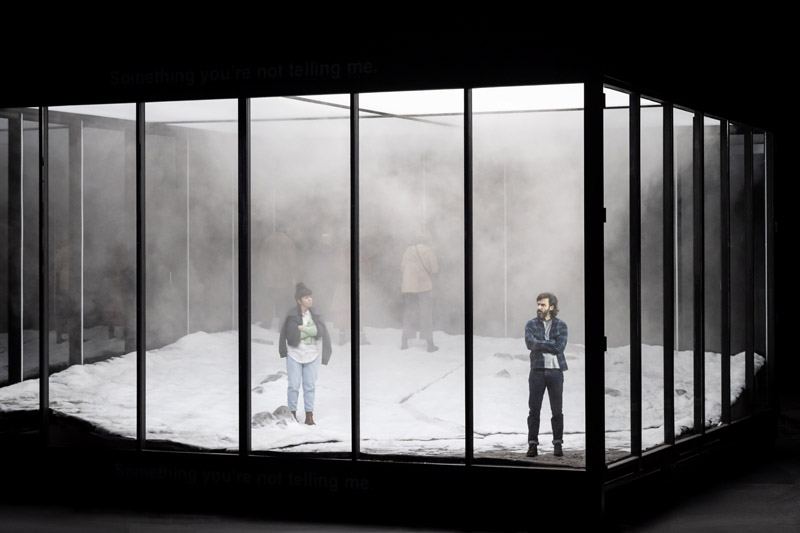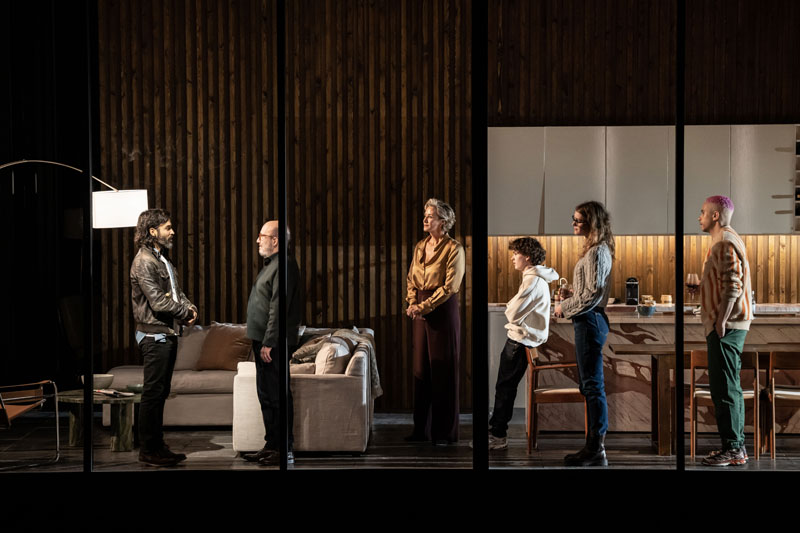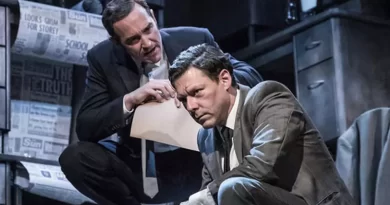“Phaedra”, National Theatre’s Lyttelton
Neil Dowden on the South Bank
14 February 2023
Simon Stone has made an international reputation as a writer-director in the theatre with his modern, iconoclastic reinterpretations of classic dramas. These include Ibsen’s The Wild Duck, Euripides’ Medea, and most recently in London his award-winning 2016 production of Yerma loosely based on Lorca’s tragedy. His new show Phaedra “after Euripides, Seneca and Racine” is a radical re-think of the Greek myth later explored in Roman classical and French neo-classical theatre which has connections to these traditions but goes off on its own singular course.

Sirine Saba and Assaad Bouab.
Photo credit: Johan Persson.
The links to the original story are tenuous to begin with. We see a liberal, middle-class family in their stylish London home preparing for dinner where the light-hearted banter has an edge suggesting serious tensions between them. The domineering Helen, a shadow minister waiting to come into power, clashes with her NGO daughter Isolde who has been unable to have a child with her hipster partner Eric, while Helen’s sharply self-deprecating Anglo-Iranian diplomat husband Hugo mocks his teenage schoolboy son Declan.
But the dysfunctional nature of the family only really becomes apparent with the unexpected arrival of Sofiane, a Moroccan dissident who is the son of Helen’s lover when she was a young woman. The warm welcome he receives turns into a bitter bust-up after he blames Helen for the death of his father in a car crash. But he returns later to apologize, sparking an affair with Helen then also with Isolde that goes on to threaten both family relationships and Helen’s political career.
The classic Phaedra/Hippolytus story of the illicit lust of a king’s wife for her stepson whom she later accuses of rape to protect her name is changed to the obsessive desire of a woman for her former boyfriend’s son. But there is still the taboo of an overtly sexual older woman pursuing a younger man with equally destructive consequences. Stone is interested in this dynamic – mixed in with the element of Western post-colonial exploitation and guilt. Helen seems to be trying to re-live her youth by resurrecting the spirit of the man she was in love with via his son. But Sofiane’s motives are deeply ambiguous – is he fulfilling some adolescent erotic fantasy (with Isolde reminding him of the young Helen), or exacting revenge for his dead father who he believes was corrupted by Helen’s decadent lifestyle?

The ensemble.
Photo credit: Johan Persson.
There is also the rivalry between mother and daughter for his affections – and the impact this has on their respective partners. This has more than a touch of Pasolini’s film Theorem in which an enigmatic, attractive outsider splits open an already divided bourgeois family by sleeping with all of them in turn – though here it is just the females. Stone’s story is darkly compelling but never really engages our underlying emotions as we witness open-mouthed the playing-out of a destructive passion.
Stone’s production is inventive though at times a tad self-indulgent. It starts with us hearing the tape-recording of a French-accented man speaking to his son from beyond the grave whom we realize later is Sofiane’s father. A lot of the dialogue in the opening scene between family members is overlapping so it’s difficult to catch all of it. Like Yerma, the action once again takes place within a rotating glass cube with the cast amplified by mics as if the characters are trapped, but also creating a rather distancing effect. Chloe Lamford’s arresting design moves from fashionable metropolitan domestic interior and upmarket restaurant to pampas-grass field and fogged-up rocky Moroccan landscape.
As the wayward Helen, Janet McTeer (recently seen as a supercilious food critic in the horror film The Menu) makes a triumphant appearance on the London stage for the first time since her superb performance in Les Liaisons Dangereuses at the Donmar Warehouse in 2015. She does not try to make her privileged character likeable, but shows how her increasingly reckless behaviour stems from deep-lying impulses that she cannot control. Assaad Bouab (Call My Agent!) also impresses as the mixed-up, self-conflicted Sofiane who does not know what he wants, and does not feel at ease either in his own country or in England, but is irresistibly drawn to the dangerous edges.
Paul Chahidi is an entertainingly droll Hugo whose sardonic quips mask a deep anger at not being valued. Mackenzie Davis plays the progressive but insecure and unfulfilled Isolde, with John MacMillan as the pink-haired metrosexual Eric whose tolerance has its limits. Archie Barnes is the amusingly precocious Declan, while Akiya Henry is Helen’s British-Nigerian colleague and confidante Omolara who tries to bring her friend back to her senses but to no avail.









